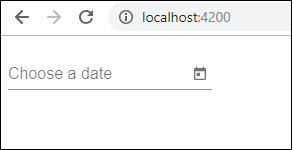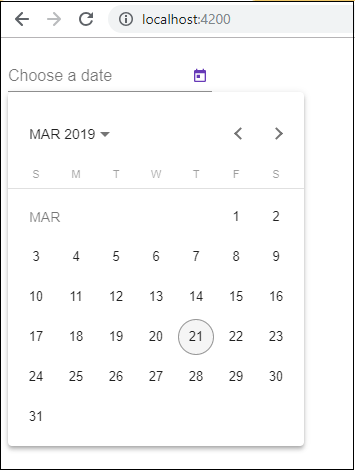
- Angular7 教程
- Angular7 - 主页
- Angular7 - 概述
- Angular7 - 环境设置
- Angular7 - 项目设置
- Angular7 - 组件
- Angular7 - 模块
- Angular7 - 数据绑定
- Angular7 - 事件绑定
- Angular7 - 模板
- Angular7 - 指令
- Angular7 - 管道
- Angular7 - 路由
- Angular7 - 服务
- Angular7 - Http 客户端
- Angular7 - CLI 提示
- Angular7 - 表单
- 材料/CDK-虚拟滚动
- Angular7 - 材质/CDK - 拖放
- Angular7 - 动画
- Angular7 - 材料
- 测试和构建 Angular7 项目
- Angular7 有用资源
- Angular7 - 快速指南
- Angular7 - 有用的资源
- Angular7 - 讨论
Angular7 - 材料
材料为您的项目提供了许多内置模块。自动完成、日期选择器、滑块、菜单、网格和工具栏等功能可与 Angular 7 中的材料一起使用。
要使用材料,我们需要导入包。Angular 2 也具有上述所有功能,但它们可以作为@angular/core 模块的一部分提供。从 Angular 4 开始,材料模块已通过单独的模块@angular/materials 提供。这有助于用户仅导入项目中所需的材料。
要开始使用materials,您需要安装两个包:materials和cdk。材质组件依赖于动画模块来实现高级功能。因此,您需要相同的动画包@angular/animations。该软件包已在上一章中更新。我们已经在前面的章节中为虚拟和拖放模块安装了 @angular/cdk 包。
以下是将材料添加到您的项目的命令 -
npm install --save @angular/material
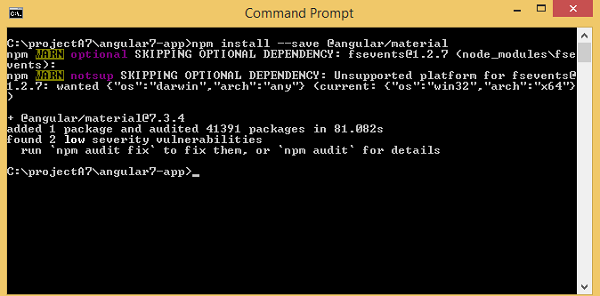
现在让我们看看 package.json。@Angular/Material和@Angular/cdk已安装。
{
"name": "angular7-app",
"version": "0.0.0",
"scripts": {
"ng": "ng",
"start": "ng serve",
"build": "ng build",
"test": "ng test",
"lint": "ng lint",
"e2e": "ng e2e"
},
"private": true,
"dependencies": {
"@angular/animations": "~7.2.0",
"@angular/cdk": "^7.3.4",
"@angular/common": "~7.2.0",
"@angular/compiler": "~7.2.0",
"@angular/core": "~7.2.0",
"@angular/forms": "~7.2.0",
"@angular/material": "^7.3.4",
"@angular/platform-browser": "~7.2.0",
"@angular/platform-browser-dynamic": "~7.2.0",
"@angular/router": "~7.2.0",
"core-js": "^2.5.4",
"rxjs": "~6.3.3",
"tslib": "^1.9.0",
"zone.js": "~0.8.26"
},
"devDependencies": {
"@angular-devkit/build-angular": "~0.13.0",
"@angular/cli": "~7.3.2",
"@angular/compiler-cli": "~7.2.0",
"@angular/language-service": "~7.2.0",
"@types/node": "~8.9.4",
"@types/jasmine": "~2.8.8",
"@types/jasminewd2": "~2.0.3",
"codelyzer": "~4.5.0",
"jasmine-core": "~2.99.1",
"jasmine-spec-reporter": "~4.2.1",
"karma": "~3.1.1",
"karma-chrome-launcher": "~2.2.0",
"karma-coverage-istanbul-reporter": "~2.0.1",
"karma-jasmine": "~1.1.2",
"karma-jasmine-html-reporter": "^0.2.2",
"protractor": "~5.4.0",
"ts-node": "~7.0.0",
"tslint": "~5.11.0",
"typescript": "~3.2.2"
}
}
我们突出显示了为处理材质而安装的软件包。
我们现在将导入父模块 - app.module.ts中的模块,如下所示。
import { BrowserModule } from '@angular/platform-browser';
import { NgModule } from '@angular/core';
import { AppRoutingModule , RoutingComponent} from './app-routing.module';
import { AppComponent } from './app.component';
import { NewCmpComponent } from './new-cmp/new-cmp.component';
import { ChangeTextDirective } from './change-text.directive';
import { SqrtPipe } from './app.sqrt';
import { MyserviceService } from './myservice.service';
import { HttpClientModule } from '@angular/common/http';
import { ScrollDispatchModule } from '@angular/cdk/scrolling';
import { DragDropModule } from '@angular/cdk/drag-drop';
import { ReactiveFormsModule } from '@angular/forms';
import { BrowserAnimationsModule } from '@angular/platform-browser/animations';
import { MatButtonModule, MatMenuModule, MatSidenavModule } from '@angular/material';
@NgModule({
declarations: [
SqrtPipe,
AppComponent,
NewCmpComponent,
ChangeTextDirective,
RoutingComponent
],
imports: [
BrowserModule,
AppRoutingModule,
HttpClientModule,
ScrollDispatchModule,
DragDropModule,
ReactiveFormsModule,
BrowserAnimationsModule,
MatButtonModule,
MatMenuModule,
MatSidenavModule
],
providers: [MyserviceService],
bootstrap: [AppComponent]
})
export class AppModule { }
在上面的文件中,我们从@angular/materials导入了以下模块。
import { MatButtonModule, MatMenuModule, MatSidenavModule } from '@angular/material';
导入数组中也使用了相同的内容,如下所示 -
imports: [ BrowserModule, AppRoutingModule, HttpClientModule, ScrollDispatchModule, DragDropModule, ReactiveFormsModule, BrowserAnimationsModule, MatButtonModule, MatMenuModule, MatSidenavModule ],
app.component.ts 如下所示 -
import { Component } from '@angular/core';
@Component({
selector: 'app-root',
templateUrl: './app.component.html',
styleUrls: ['./app.component.css']
})
export class AppComponent {
constructor() {}
}
现在让我们在styles.css中添加材质 CSS 支持。
@import "~@angular/material/prebuilt-themes/indigo-pink.css";
现在让我们在 app.component.html 中添加材质
菜单
要添加菜单,请使用<mat-menu></mat-menu> 。文件和另存为项目将添加到 mat- menu下的按钮中。添加了一个主按钮Menu。通过使用[matMenuTriggerFor]="menu"并使用带有# in<mat-menu> 的菜单来给出相同的参考。
应用程序组件.html
<button mat-button [matMenuTriggerFor] = "menu">Menu</button> <mat-menu #menu = "matMenu"> <button mat-menu-item> File </button> <button mat-menu-item> Save As </button> </mat-menu>
下图显示在浏览器中 -

单击菜单将显示其中的项目 -
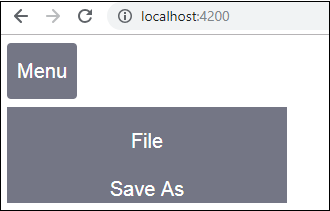
侧导航
要添加 sidenav,我们需要<mat-sidenav-container></mat-sidenav-container>。<mat-sidenav></mat-sidenav>作为子项添加到容器中。添加了另一个 div,它通过使用(click)="sidenav.open()"触发 sidenav 。
应用程序组件.html
<mat-sidenav-container class="example-container" fullscreen>
<mat-sidenav #sidenav class = "example-sidenav">
Angular 7
</mat-sidenav>
<div class = "example-sidenav-content">
<button type = "button" mat-button (click) = "sidenav.open()">
Open sidenav
</button>
</div>
</mat-sidenav-container>
应用程序组件.css
.example-container {
width: 500px;
height: 300px;
border: 1px solid rgba(0, 0, 0, 0.5);
}
.example-sidenav {
padding: 20px;
width: 150px;
font-size: 20px;
border: 1px solid rgba(0, 0, 0, 0.5);
background-color: #ccc;
color:white;
}
以下是浏览器中菜单和侧导航的显示 -
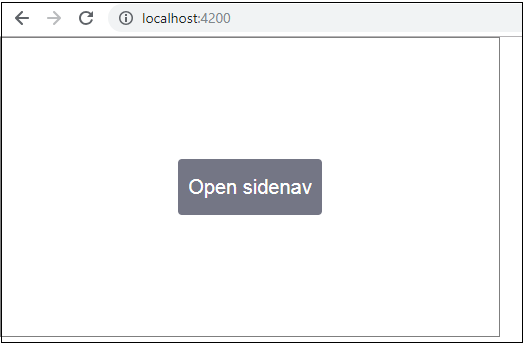
如果我们单击“Open Sidenav”,则会在左侧打开以下面板 -
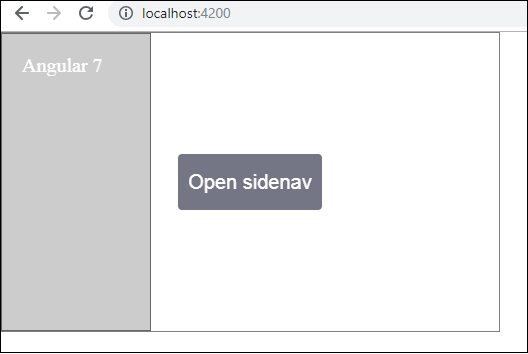
日期选择器
现在让我们使用材质添加一个日期选择器。要添加日期选择器,我们需要导入显示日期选择器所需的模块。
在app.module.ts中,我们为日期选择器导入了以下模块,如下所示:
import { BrowserModule } from '@angular/platform-browser';
import { NgModule } from '@angular/core';
import { AppRoutingModule , RoutingComponent} from './app-routing.module';
import { AppComponent } from './app.component';
import { NewCmpComponent } from './new-cmp/new-cmp.component';
import { ChangeTextDirective } from './change-text.directive';
import { SqrtPipe } from './app.sqrt';
import { MyserviceService } from './myservice.service';
import { HttpClientModule } from '@angular/common/http';
import { ScrollDispatchModule } from '@angular/cdk/scrolling';
import { DragDropModule } from '@angular/cdk/drag-drop';
import { ReactiveFormsModule } from '@angular/forms';
import { BrowserAnimationsModule } from '@angular/platform-browser/animations';
import { MatDatepickerModule, MatInputModule, MatNativeDateModule } from '@angular/material';
@NgModule({
declarations: [
SqrtPipe,
AppComponent,
NewCmpComponent,
ChangeTextDirective,
RoutingComponent
],
imports: [
BrowserModule,
AppRoutingModule,
HttpClientModule,
ScrollDispatchModule,
DragDropModule,
ReactiveFormsModule,
BrowserAnimationsModule,
MatDatepickerModule,
MatInputModule,
MatNativeDateModule
],
providers: [MyserviceService],
bootstrap: [AppComponent]
})
export class AppModule { }
在这里,我们导入了 MatDatepickerModule、MatInputModule 和 MatNativeDateModule 等模块。
现在,app.component.ts 如下所示 -
import { Component } from '@angular/core';
@Component({
selector: 'app-root',
templateUrl: './app.component.html', s
tyleUrls: ['./app.component.css']
})
export class AppComponent {
constructor() {}
}
app.component.html如下所示-
<mat-form-field> <input matInput [matDatepicker] = "picker" placeholder = "Choose a date"> <mat-datepicker-toggle matSuffix [for] = "picker"></mat-datepicker-toggle> <mat-datepicker #picker></mat-datepicker> </mat-form-field>
在 style.css 中添加全局 css -
/* You can add global styles to this file, and also
import other style files */
@import '~@angular/material/prebuilt-themes/deeppurple-amber.css';
body {
font-family: Roboto, Arial, sans-serif;
margin: 10;
}
.basic-container {
padding: 30px;
}
.version-info {
font-size: 8pt;
float: right;
}
日期选择器显示在浏览器中,如下所示 -
